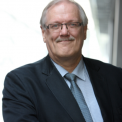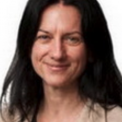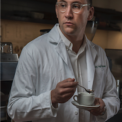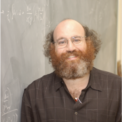Our Solar System was born from a dark and cold cloud made out of molecular gas and small dust particles. Thanks to powerful telescopes, we can now study in detail these clouds, their chemical ingredients and their evolution. We can then reconstruct our origins. Interstellar molecules are unique tracers of the dynamical and chemical evolution of star and planet forming regions. Thus, astrochemistry is crucial to test theories and shed light on our origins. In this talk I shall review the chemical and physical structure of interstellar clouds, where stars and planets are formed, as well as theoretical work on protoplanetary disk formation and early evolution. Links to our Solar System will be made.
Events Calendar View
-
Departmental Colloquium
Oct 1, 2020
Our Astrochemical Origins
-
CSP Lunch Seminar
Oct 6, 2020
Development and Assessment of a Quantum Genomic Classifier
Join Zoom MeetingMeeting ID: 966 6574 9477One tap mobile+16465588656,,96665749477# US (New York)+13017158592,,96665749477# US (Germantown)Dial by your location+1 646 558 8656 US (New York)+1 301 715 8592 US (Germantown)+1 312 626 6799 US (Chicago)+1 669 900 9128 US (San Jose)+1 253 215 8782 US (Tacoma)+1 346 248 7799 US (Houston)Meeting ID: 966 6574 9477Find your local number: https://zoom.us/u/abxR21u1gXJoin by SIPJoin by H.323162.255.37.11 (US West)162.255.36.11 (US East)115.114.131.7 (India Mumbai)115.114.115.7 (India Hyderabad)213.19.144.110 (Amsterdam Netherlands)213.244.140.110 (Germany)103.122.166.55 (Australia)149.137.40.110 (Singapore)64.211.144.160 (Brazil)69.174.57.160 (Canada)207.226.132.110 (Japan)Meeting ID: 966 6574 9477
-
Departmental Colloquium
Oct 8, 2020
Systematically improving coffee: mathematics and experiment
Numerous physical and chemical processes play a determining role in cup quality, ranging from agricultural practices, to roasting and brewing. This talk canvases the landscape of coffee research to date, detailing areas that require further study, as well as discussing our early efforts to better understand the key factors that determine cup quality and reproducibility. The talk will touch on three key research areas; the chemistry of water, the physics of grinding (including cryogenics), and our latest endeavors of using mathematical modeling to improve espresso reproducibility.
-
CSP Lunch Seminar
Oct 13, 2020
Development and Assessment of a Quantum Genomic Classifier - Part II
Join Zoom MeetingMeeting ID: 966 6574 9477One tap mobile+16465588656,,96665749477# US (New York)+13017158592,,96665749477# US (Germantown)Dial by your location+1 646 558 8656 US (New York)+1 301 715 8592 US (Germantown)+1 312 626 6799 US (Chicago)+1 669 900 9128 US (San Jose)+1 253 215 8782 US (Tacoma)+1 346 248 7799 US (Houston)Meeting ID: 966 6574 9477Find your local number: https://zoom.us/u/abxR21u1gXJoin by SIPJoin by H.323162.255.37.11 (US West)162.255.36.11 (US East)115.114.131.7 (India Mumbai)115.114.115.7 (India Hyderabad)213.19.144.110 (Amsterdam Netherlands)213.244.140.110 (Germany)103.122.166.55 (Australia)149.137.40.110 (Singapore)64.211.144.160 (Brazil)69.174.57.160 (Canada)207.226.132.110 (Japan)Meeting ID: 966 6574 9477
-
Departmental Colloquium
Oct 15, 2020
The physics of life: Taking theory seriously
Theoretical physics is the search for compact and compelling mathematical descriptions of the world around us. This is an ambitious, and extraordinarily successful, activity. We can predict what is seen when we look deep into the atomic nucleus and deep into the farthest reaches of space. But the phenomena of life have largely evaded the powerful predictive umbrella of theoretical physics.
In recent years we have seen glimpses of what a theoretical physics of living systems might look like. We have been able to go from general principles to the properties of particular systems, with examples ranging from developing embryos to coding and computation in the brain and the emergence of order in flocks of birds. It is especially exciting to see agreement between theory and experiment with “physics level” precision in the complex context of living organisms. I’ll give a survey of these ideas, and point to what might come in the next few years.
-
Departmental Colloquium
Oct 22, 2020
Social Physics: Data-Driven Analysis and Computational Modelling of Human Social Connectome

Guest: Kimmo Kaski, Aalto University School of Science, Finland The Alan Turing Institute, British Library, UK Wolfson College & CABDyN Complexity Cent, Said Business School, Oxford University, UK Complexity Science Hub Vienna, Austria
Thursday, October 22, 2020 3:55 pm - 4:55 pm
Location: Zoom Meeting https://zoom.us/j/97410561833The study of large-scale socially relevant datasets using Network Theory based data analysis and computational modelling approaches yield unprecedented insight into human sociality and social/societal structures and behavioural processes. This is well-demonstrated by our analysis of large mobile phone dataset, confirming the Granovetterian picture of social networks being modular, having communities with strong internal ties and linked with weaker external ties {1}. As the data also includes mobile phone users’ demographics, i.e. gender and age, we have studied the nature of human social interactions from Dunbarian egocentric viewpoint and got a deeper insight into the gender and age-related social behaviour patterns and dynamics of human relationships, across their lifespan {2}. With the help of open geophysical (sunrise, sunset, length of daylight), seasonal (daily temperature) and geographical (population distribution) data, we investigated the influence of seasonality and geographical location on human activity patterns, observing two daily inactivity/resting periods, such that the nocturnal resting period is influenced by the length of daylight and latitudinal location the person lives, and the afternoon resting period by the temperature, and that the afternoon and nocturnal resting periods appear to be counterbalancing each other {3,4}. To get deeper understanding of the above-described phenomena, the next step is to develop models of human sociality, social/societal networks and processes of their formation and information spreading. One of our models, based on network sociology mechanisms for making friends, produced many empirically observed Granovetterian features of social networks, such as meso- scale community and macro-scale topology formation {5,6}. In subsequent models we investigated the roles of social networks being layered, multiplexing or context based, geography dependent, and having relationships between people changing in time. In sum, the large-scale data-driven analytics and modelling approaches to social systems opens up an unprecedented perspective to gain understanding of human sociality from individual to societal level, which with the availability of various socially relevant datasets and development of computational methodologies could lead to tools of social and societal design.
Page 104 of 121, showing 6 records out of 723 total, starting on record 619, ending on 624




